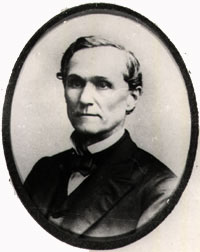John Gill Shorter (1818-1872)
John Gill Shorter was born in Monticello, Georgia, on April 3, 1818. His father, Dr. Reuben C. Shorter, a physician and planter, had come from Virginia to Georgia as a young man and had become a leader in the rising Jacksonian party.
 In 1833 the Shorter family moved to Eufaula, Barbour County, Alabama, and four years later John Gill graduated from the University of Georgia. In 1838 the younger Shorter was admitted to the Alabama Bar and in 1843 he married Mary Jane Battle, the daughter of a wealthy Barbour County planter.
In 1833 the Shorter family moved to Eufaula, Barbour County, Alabama, and four years later John Gill graduated from the University of Georgia. In 1838 the younger Shorter was admitted to the Alabama Bar and in 1843 he married Mary Jane Battle, the daughter of a wealthy Barbour County planter.
The law firm of John Gill and Eli Shorter (John's brother) prospered, the family holdings grew extensively, and by 1845 John Gill was a member of the state Senate as a Democrat from Barbour County. In 1852 he was elected to the circuit judgeship of the Eufaula District, a post to which he was re-elected six years later.
A disciple of William L. Yancey, John Gill Shorter was an ardent secessionist and a member of the so-called "Eufaula Regency," a small group of lawyer/planters in Barbour County who were instrumental in taking Alabama out of the Union in 1861.
Shorter served in the Confederate Congress in Montgomery, Alabama, and Richmond, Virginia, until he became governor of Alabama on December 2, 1861. He served only one two-year term. His governorship was devoted to dealing with the problems and issues of the civil war as well as Alabama's relationship with the confederate government. Predominate issues included the defense of Mobile, raising troops (especially for the home front), caring for the indigent families of soldiers, taxes, slave impressment, raising arms, conscription, military training, military desertion, food supplies, the ban on wartime distillation, the scarcity of salt, the relationship between the state's civil and military authorities, state's rights (especially in regard to providing supplies to the Confederate government) and financing the war.
An able and energetic war governor, Shorter was nevertheless defeated in the 1863 election, a casualty of the protests against the 1861 secessionists, the unsuccessful war, and anti-Democratic party sentiment.
Shorter retired to Eufaula for the remaining years of his life, continuing his law practice, and appearing briefly at the conservative Reconstruction meetings in Montgomery at the end of the war.
He died on May 29, 1872.
 In 1833 the Shorter family moved to Eufaula, Barbour County, Alabama, and four years later John Gill graduated from the University of Georgia. In 1838 the younger Shorter was admitted to the Alabama Bar and in 1843 he married Mary Jane Battle, the daughter of a wealthy Barbour County planter.
In 1833 the Shorter family moved to Eufaula, Barbour County, Alabama, and four years later John Gill graduated from the University of Georgia. In 1838 the younger Shorter was admitted to the Alabama Bar and in 1843 he married Mary Jane Battle, the daughter of a wealthy Barbour County planter.